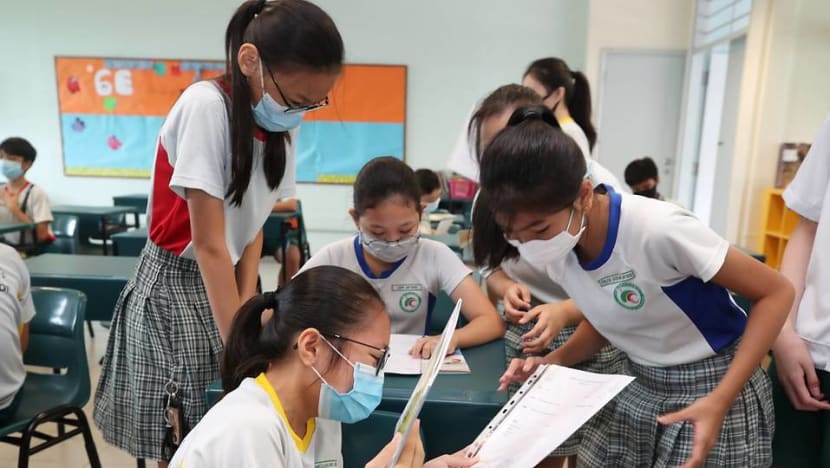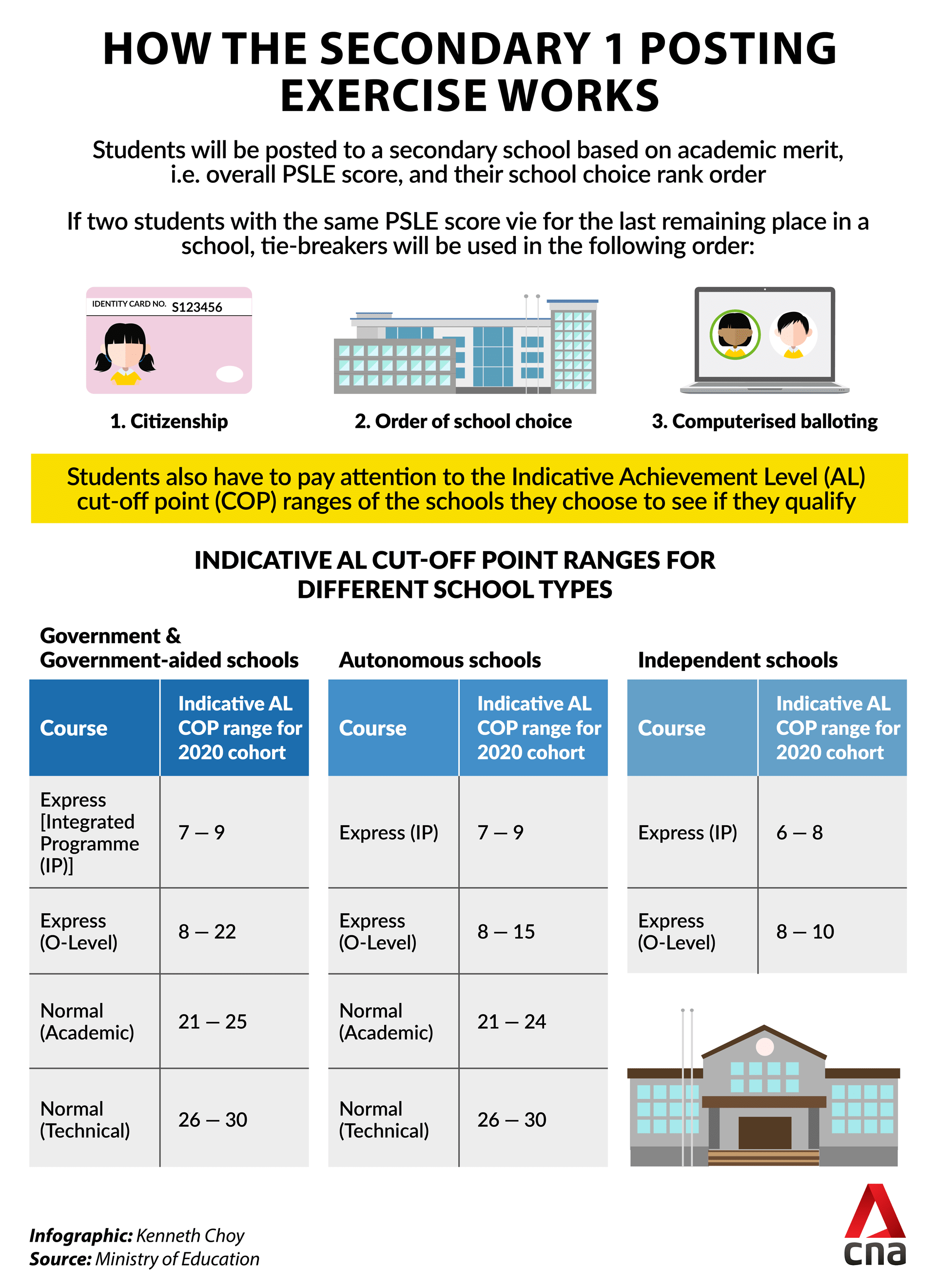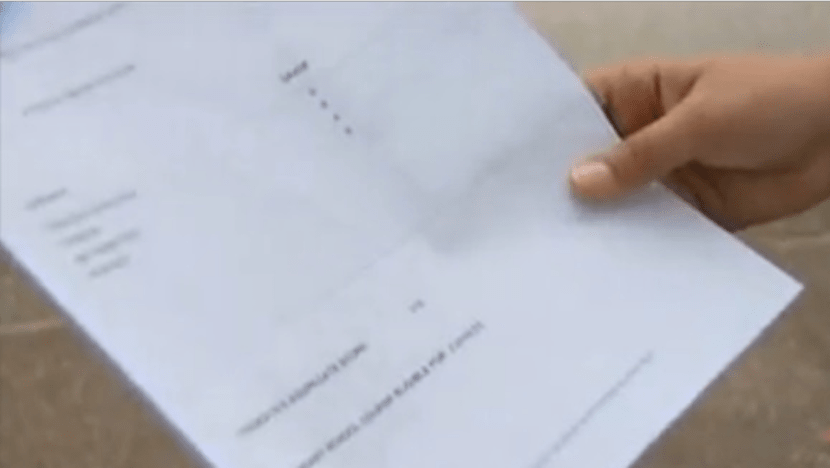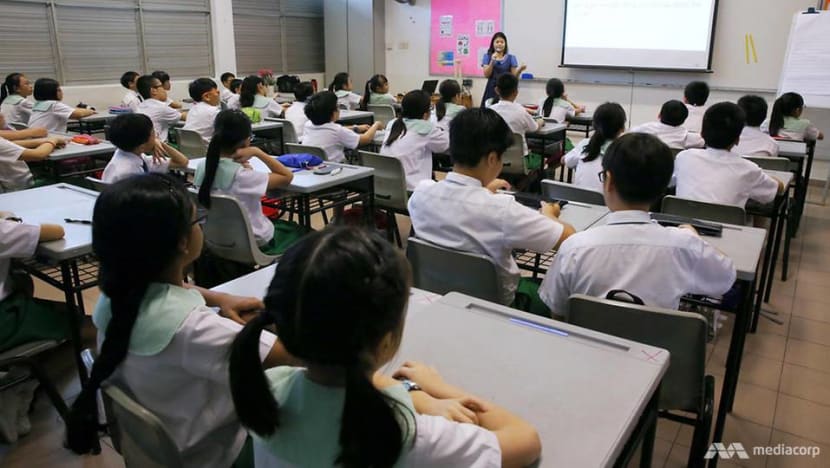commentary Commentary
Commentary: New PSLE scoring, cut-off points for secondary school are stressful for parents all the same
The aim to reduce exam stress cannot work when the bigger educational eco-system makes it a race to the finish for parents, says Cherie Tseng.

Students at Northoaks Primary School collect their PSLE results on Nov 25, 2020. (Photo: Facebook/Lee Hsien Loong)
SINGAPORE: For a world that loves to Konmari their home, embrace the minimalist lifestyle and share little Instagram posters about not sweating the details, we are oddly enamoured by life scorecards like Tik Tok likes, Facebook shares and Amazon reviews.
Big data, trends, patterns — we like it when we have information on performance and how something or someone is doing. Indicators of the state of play. And nowhere is this played out more keenly than in the nation’s Primary School Leaving Exams (PSLE).
On Tuesday (Apr 27), the Ministry of Education (MOE) released indicative PSLE scores for secondary schools, following the new PSLE scoring system.
MOE had scrapped the traditional old T-Score system, and replaced it with the Achievement Level (AL) scoring system.
Unlike the T-Score system that ranks a student's performance in the PSLE in relation to his peers, the AL system assigns each pupil a score based on how well he or she has done in the subject, independent of how others fare.

This year’s Primary 6 students will be the inaugural batch under the new system.
To quell the uncertainty on the ground over the new AL system, MOE released simulated cut-off points for secondary schools. Scores were generated based on the 2020 cohort's PSLE results and school choice patterns, simulating each pupil's individual subject score in AL terms and adding the scores for each subject to form the total PSLE score.
READ: FAQ: What you should know about the PSLE scoring system and cut-off points for secondary schools
It shouldn’t be shocking yet the news triggered an upheaval in parent chatgroups across the island. Within the hour, people had consolidated lists of cut-of-points of all the schools, with discussion on the accuracy of the simulated scores was rife.
Some fretted about how their children could do when some bands had wide mark ranges and the implications for their secondary school posting.
A friend said her stress level spiked. Another said this added even more uncertainty to an already unpredictable year.
We cannot help ourselves because of how important national examinations are and by extension, the fervent lengths parents and students generally go to do well in sunny Singapore.
PARENTS VS THE SYSTEM
Take the Direct School’s Admission for secondary school (DSA) for instance. It allows Primary 6 students to seek admission based on their talent in sports, co-curricular activities and academic areas.
Not a top scorer in the classroom but is one on the soccer field? Apply for school entry on the merits of your ball-kicking prowess.
Unfortunately, the system, favours the better connected and better heeled. Since it is hard to differentiate between the many Grade 8 music applicants, you’d be looking at other achievements like competition outcomes and even a personal portfolio - something wealthier families have easier access to be it to pay for masterclasses or to fly overseas to take part in a luminary competition.

Consider, even, the Primary 1 and 2 report-card system where, instead of grades, students are accorded levels of competency to specific learning outcomes: Beginning, Developing, Competent and Accomplished.
The aim of this is to focus on a child’s learning progress instead of how well they tested. While this removes the glaringness of a raw score, for most parents, they simply equate an A grade to Accomplished, B grade to a Competent assessment and so forth.
And the same question remains: How do I get my child to the next level? It is true that the old T-score system drives parents, teachers and student alike to prime for even one extra mark, but the new AL system might simply make people push to level up by a whole band.
READ: Commentary: PSLE scores could impact life outcomes. So don’t let them
Or perhaps, there may added interest in pursuing the DSA route and we’d see students pushed to excel both in class and out. All of this is well intended but what are the costs of a parent desperately advocating for their child?
Another example of how things are different and yet the same: The differences in entry scores for affiliated students versus non-affiliated ones. For example, Maris Stella High has an indicative range of eight to 16 points for affiliated students and seven to 12 for non-affiliated students entering its express O-Level course.
Yes, this system of affiliation has been in place for many years now but all parents see when confronted by these numbers is that the stakes at the start of the journey are still high.
This is why we will still have folks emptying their wallets for a home near a top school at Primary One, to ensure that even if junior doesn’t make the cut on his own, all those affiliated discounts will see him through to secondary four.
Can we blame them?
READ: Commentary: Teachers can focus better if subjective, irrelevant factors removed from annual appraisals
IS IT REALLY ABOUT EXAMS OR EXAM STRESS?
When you strip things bare, people don’t have an issue with examinations per se.
They decry the stressfulness that comes with the turf, the nagging parenting self-doubt about how far to help or push the child, and even the inconvenience of weathering the examination season.

While the Ministry has taken great pains to tell parents this is better, I am not holding my breath that this new PSLE scoring iteration will inherently change how any stakeholders actually behave.
The signs have always been there.
Schools will scrap mid-year exams permanently for some levels, but it its place are still “weighted assessments” whose grade still counts to a child’s yearly performance.
The scope of what is tested is certainly smaller, but the weightage is still substantial. And so, the truth is, the trudge for students and parents continues.
Schools may have done away with many scoring awards, but at the least, at the end of each year, the top quintile of each cohort still gets a merit bursary award from their Community Development Councils (CDC).
READ: Commentary: PSLE scores and the problem with the beloved late bloomer narrative
With some sort of grade or other still in play, the multi-billion dollar tuition industry is unlikely to change. Parents and students will likely still semi-willingly march behind.
It is hard to truly believe in a learning panacea when Singapore’s office bearers admit that meritocracy will remain a key principle for recognising individuals in Singapore.”
This is ironic when sociologist Michael Young who coined the term “Meritocracy” back in the 1950s meant it not so much as a plea for opportunities for all, but as a warning against a system that reduces humans to units of merit.
READ: Commentary: Grappling with the sadness and outrage triggered by school mergers
Layer on the fact that our O-level examination results is stored even in our Singpass - it sends a dichotomous message: Please, children of Singapore, know that you are not your grade. But by the way, adults, your grades will haunt you for the rest of your life.
WHAT NEEDLE ARE WE HOPING TO MOVE?
I can fully appreciate the logic behind this new PSLE scoring system. It is hard not to feel that the new AL system misses the mark not in its intention, but in its assumption that the everyday Singapore parent is able to rise above the tyranny of (well-meaning) kiasuism.
It is hubris to say we need the conversation to be less about scoring rubric and more about the purpose of learning, where learning is more about process, less about project success; more about application and not just knowledge cumulation and regurgitating.
Or suggest that we need a lighter syllabus and a less pedantic way of awarding marks.

The conversation we should have, perhaps, is less about what needs to be done, and more about how we need to change in defining what makes a good student in school and of life.
READ: Commentary: These PSLE changes won’t fix our national obsession with academic achievement
The conundrum is how to divorce the rabid race of grade-point one-upmanship from the intended purposes of examinations.
It almost makes me wish for a simpler time, with a less complicated system, where I could go to a school near my home and if I did well, was able to progress by sheer dint of hard work. My children face quite a different world.
As we have done before, parents will need to march on and address our own expectations. Dr Abishek Mathew Abraham, Senior Psychiatrist and Medical Director of Better Life Clinic suggests: “ We need to shift the conversation away from a ‘my life depends on this moment’ to a ‘this is a journey of growth with progress and setbacks’.”
“Students, parents, teachers and adults need to realise that success is not an end state. Our lives are not unfulfilled, bad or of less value just because we meet with a setback.”
Now if only we can remember this each time we get frustrated that our children are not keeping up with the kid next door or feel deflated when reading about a straight-A student praised on Facebook.
Cherie Tseng is Chief Operations Officer at a local fintech company, a mother of three and editor with The Birthday Collective.
(Listen to three working adults reveal how their PSLE results have shaped their life journeys in a no-holds barred conversation on CNA's Heart of the Matter podcast:)














